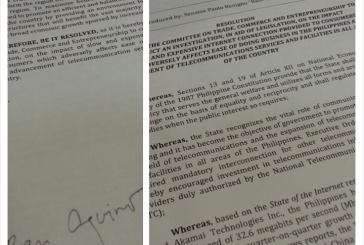SRN-620: Impact of Slow and Expensive Internet Connection
RESOLUTION DIRECTING THE COMMITTEE ON TRADE, COMMERCE AND ENTREPRENEURSHIP TO CONDUCT AN INVESTIGATION, IN AID OF LEGISLATION, ON THE IMPACT OF SLOW AND EXPENSIVE INTERNET CONNECTION PROVIDED TO CONSUMERS WHICH ADVERSELY AFFECTS EASE OF DOING BUSINESS IN THE PHILIPPINES AND ADVANCEMENT OF TELECOMMUNICATIONS SERVICES AND FACILITIES IN ALL AREAS OF THE COUNTRY
Whereas, Sections 13 and 19 of Article XII on National Economy and Patrimony of the 1987 Philippine Constitution provide that the State shall pursue a trade policy that serves the general welfare and utilizes all forms and arrangements of exchange on the basis of equality and reciprocity and shall regulate or prohibit monopolies when the public interest so requires;
Whereas, the State recognizes the vital role of communications in nation building and it has become the objective of government to promote advancement in the field of telecommunications and the expansion of telecommunication services and facilities in all areas of the Philippines. Executive Order No. 59 (s 1993) required mandatory interconnection for other telecommunications firms and thereby encouraged investment in telecommunications infrastructure by service providers duly authorized by the National Telecommunications Communications (NTC);
Whereas, based on the State of the Internet report made by Massachusettsbased Akamai Technologies Inc., the Philippines had an average peak Internet connection speed of 32.6 megabits per second (Mbps) in the 4th quarter of 2013, representing a 103% quarter-on-quarter growth and a 144% rise from the same period in 2012. According to news reports, the Philippines’ average peak Internet connection speed is faster than that of China and several countries in the AsiaPacific region but its low use of broadband technology as well as high costs for Internet users compared to other countries mean slow average connection speeds for consumers. Reports showed that the Philippines had the slowest Internet connection among members of the Association for Southeast Asian Nations (ASEAN);
Whereas, there is a need to ensure that all users of Internet services shall have access to it wherever they may be within the Philippines at an acceptable standard of service and at a reasonable cost. According to the “ASEAN Average Internet Speed Index 2014” report by the ASEAN DNA, the Philippines is at the bottom of the list of ASEAN countries (3.6 Mbps), way below the ASEAN average of 12.4 Mbps;
Whereas, Filipino consumers spend around One Thousand Pesos (Php 1,000.00) per month for Internet services with speed up to two (2) Mbps while some telecommunication companies offer speed up to five (5) Mbps at around Two Thousand Pesos (Php 2,000.00). Comparing the prices of Internet services among Southeast Asian countries, the cost to Filipino consumers is more expensive than Internet costs in Singapore and Thailand, which have the fastest Internet connections globally;
Whereas, in this era of advanced technology, improving Internet connection in the Philippines is crucial to the ASEAN Economic Integration (AEC) in 2015, which aims to transform the region into a single market and production base, and a highly competitive region. To maximize benefits from the AEC for the Filipino people, there is a need to promote an efficient and balanced flow of information into, out of and across the country by providing an environment for the emergence of communications structures that will benefit the vast majority of consumers in the country, which has broad economic growth spurred by increasing competition;
NOW, THEREFORE, BE IT RESOLVED, as it is hereby resolved to direct the Committee on Trade, Commerce and Entrepreneurship to conduct an investigation, in aid of legislation, on the impact of’ slow and expensive Internet connection provided to consumers which adversely affects ease of doing business in the Philippines and advancement of telecommunication services and facilities in all areas of the country.

Recent Comments